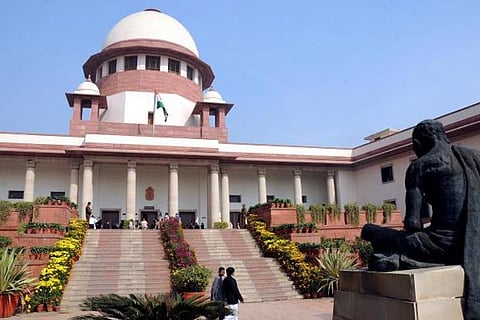

New Delhi
The apex court said a fundamental postulate of criminal jurisprudence is the presumption of innocence until found guilty, and occasionally there is a necessity to introspect if denial of bail to an accused is the right thing to do based on the facts and circumstances of a case.
A bench of justices Madan B Lokur and Deepak Gupta also said that conditions for the grant of bail ought not to be so strict as to be incapable of compliance, thereby making the grant of bail illusory.
It said one of the important facets of criminal jurisprudence is that grant of bail is the general rule and putting a person in jail is an exception.
"Unfortunately, some of these basic principles appear to have been lost sight of with the result that more and more persons are being incarcerated and for longer periods. This does not do any good to our criminal jurisprudence or to our society," it said.
The bench said the grant or denial of bail is entirely the discretion of the judge considering a case but the exercise of judicial discretion has been circumscribed by a large number of decisions rendered by the apex court and all the high courts of the country.
The bench said that various factors which need to be considered while deciding a bail plea are whether the accused was arrested during the probe, his antecedents, role in alleged offence, his willingness to join the investigation and also the poverty or the deemed indigent status.
"To put it shortly, a humane attitude is required to be adopted by a judge while dealing with an application for remanding a suspect or an accused person to police custody or judicial custody," the top court held.
"There are several reasons for this including maintaining the dignity of an accused person, howsoever poor that person might be, the requirements of Article 21 (right to live with dignity) of the Constitution and the fact that there is enormous overcrowding in prisons, leading to social and other problems as noticed by this court ...," it said.
The court made the observations while hearing the bail application of a man in a cheating case of Rs 37 lakh where an FIR was lodged in Uttar Pradesh's Gorakhpur in January 2016.
His bail plea was rejected by a trial court in Gorakhpur and later by Allahabad High Court after which he approached the apex court.
The bench noted that neither the man was arrested after the lodging of the FIR nor after filing of charge sheet. He was arrested in April 2017 and is in custody since then.
The court granted him bail saying that the facts indicate that there was no apprehension that the man would abscond or hamper the trial in any manner.
The court made it clear that it should not be understood that bail should be given in every case and the grant or refusal of bail is entirely within the discretion of the judge hearing the matter.
The bench said though that discretion is unfettered, it must be exercised judiciously and in a humane manner and compassionately.
"Also, conditions for the grant of bail ought not to be so strict as to be incapable of compliance, thereby making the grant of bail illusory," it said.
Visit news.dtnext.in to explore our interactive epaper!
Download the DT Next app for more exciting features!
Click here for iOS
Click here for Android